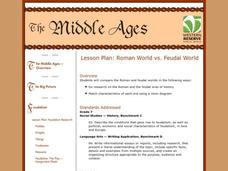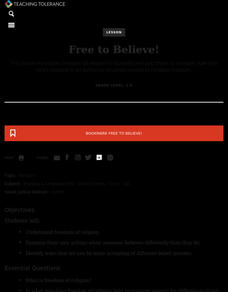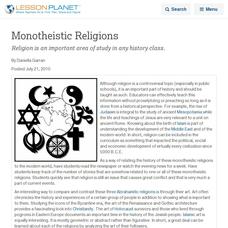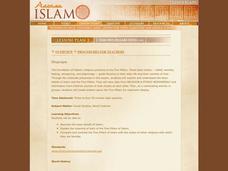Northeastern Educational Television of Ohio, Inc.
Roman World vs. Feudal World
Young historians compare the major features of the Roman and feudal worlds, such as religion, social hierarchy, and political tenets, using online resources and group discussion.
National Constitution Center
Explore Rights Around the World
How has the American Bill of Rights influenced the rest of the world? An interactive web activity helps individuals see the similarities between countries' bills of rights. A text-to-text tool compares the American Bill of Rights to...
Curated OER
Writing Exercises; Belief Systems
This cross-curricular assignment could easily accompany a religious studies or imperialism unit. Prior research is required, as historians compare and contrast major religions and describe religious expansion with regard to contributors...
Teaching Tolerance
Free to Believe!
The United States: One nation with countless religions. An interesting instructional activity focuses on the freedom of religion protected under the First Amendment. Academics learn why it is important to protect all religions, why there...
Curated OER
Bible Lesson Plan: Islam Religion
Students research the pillars of Islam. In this lesson on the Islamic religion, students work in groups to find information on one of the five pillars of Islam. Students present their information to the class, and then...
Cave Creek Unified School District
Crusades and Culture in the Middle Ages
The Crusades sounds like a glamorous time period in the Middle Ages full of glory—but was it? Scholars find and review the truth of the Crusades' influence on the world through the resource. The study guides, separated individually by...
Curated OER
The World's Most Practiced Religions
Students examine the five major religions of the world. In groups, they identify the belief system of each and research their history. They discover the various holidays and traditions of the religions. They present their findings to...
Curated OER
Great Religions of China
Students describe the belief and practices of the three major religions of China. Using primary source documents, they compare and contrast the three religions and present their findings to the class in the form on a PowerPoint...
Brain Scape
Learn About Religions
Buddhism, Christianity, Hinduism, Islam, Judaism, Taoism. The major religions of the world are the focus of a resource that uses flashcard decks to engage users in a study of the principles and practices of these belief systems.
Curated OER
Seeing the World in New Ways
Students examine the Muslim culture in Morocco. In this global studies instructional activity, students read Three Lessons by Craig Storti. Students compare the culture of Morocco to their own as they write stories pertaining to lessons...
Curated OER
World Religions: Judaism, Christianity and Islam
Students explore the three main monotheistic religions of the world: Judaism, Christianity and Islam. They compare the history, important figures, holy books, places of worship, and symbols of faith of each religion through discussion...
Curated OER
Comparing Three Religions: Islam, Judaism, and Christianity
Students work together in groups to research either Judaism, Christianity, or Islam. Once the research is complete, they share their information with the other groups in the class. They complete a worksheet on rituals and holidays in...
Curated OER
Europe – Religion and Reformation
Ninth graders examine the Reformation. In this European history lesson plan, 9th graders explore the 95 theses of Martin Luther and discuss the reaction of the Roman Catholic Church to his ideas. Students then take a quiz based on the...
University of Chicago
Comparing Modern and Ancient Ideas of Ethnicity and Identity
Explore ethnicity and identity with a research and writing assignment. Class members conduct online research, looking in particular at images and carefully noting down their sources on notecards. They read about identity and compose...
Curated OER
Feudal Japan
An excellent overview of historical Japanese culture, this presentation could carry through a world history unit or a lesson on the history of Japan. Especially interesting are the slides that compare Japanese armor and castles to other...
University of Chicago
What IS the Difference Between Sunni and Shi'ite Muslims?
The distinction between Shiite and Sunni Muslims is an often misunderstood concept, yet very important for its implications in global affairs and for a more comprehensive understanding of the religion of Islam.
Curated OER
An Introduction to Islam
Students research the basic philosophical and ethical ideas of Islam and the ways in which they are similar to or different from other major religions of the world.
Curated OER
Christianity
In this Christianity activity, students respond to 4 short answer questions about the attributes of the religion and then add details to a Venn diagram comparing Christianity and Judaism.
Curated OER
A Survey of Ancient Religions
Students examine ancient religions of Confucianism and Buddhism. Pupils prepare a K-W-L chart, Venn Diagram and participate in think-pair-share activities. Classmates compare and contrast Confucianism and Buddhism. They explore the...
Curated OER
The Five Pillars of Islam
In order to better understand Muslim civilization, culture, and politics one must first familiarize themselves on the 5 Pillars of Islam, ideas which dominate much of Muslim societal and cultural norms. Provide your learners with a...
Curated OER
Islam Religion
Students compare Christianity to Islam. In this lesson on Islamic tradition, students read the Muslim confession and tour an Islamic center or watch a video on the faith. Students look for likenesses and differences between...
Curated OER
The Unseen Army: Conscientious Objectors During World War II
Learners study World War II and why it was called "the Good War". In this World War II lesson high schoolers identify the different kinds of conscientious objectors.
Curated OER
Belief Systems Along the Silk Roads
Learners examine cultural diffusion. For this Silk Road lesson, students research primary sources to compare and contrast the religious beliefs encountered and shared by those who traded along the Silk Road route.

























